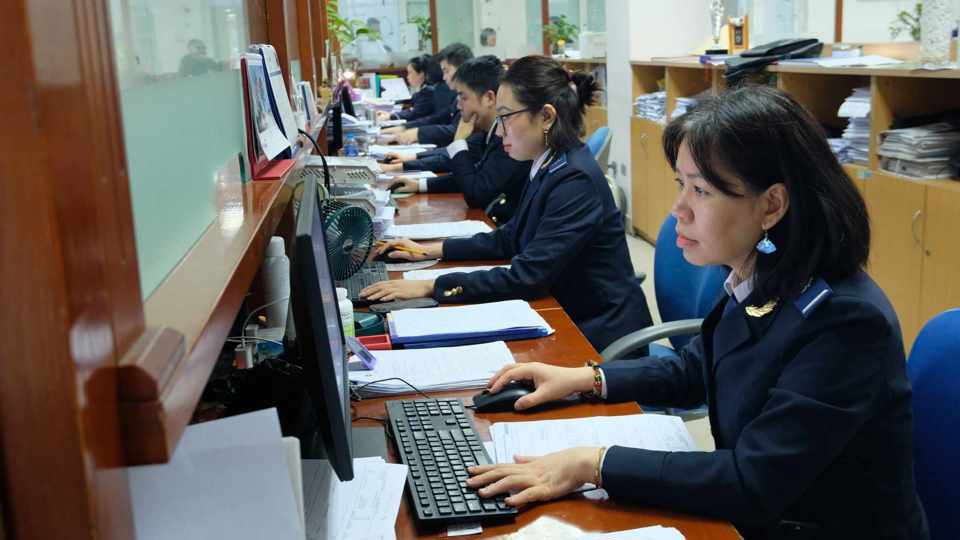Digitalization boosts Vietnam’s trade
Receiving and clearing green lane declarations takes only 1 to 3 seconds.
The effective adoption of digital transformation solutions in the customs sector has significantly facilitated business the import and export activities of businesses.
| Customs officials at Noi Bai Airport. Photo: Ngoc Linh/The Hanoi Times |
A report from the General Department of Vietnam Customs revealed the average customs clearance time for an export declaration has decreased from 1.9 days to 1.5 days, and for an import declaration, it has decreased from 2.3 days to 1.8 days.
Vice Chairman of the Hanoi Small and Medium-sized Enterprises Association (HANOISME) Mac Quoc Anh highlighted the significant improvement in trade facilitation for businesses due to the recent effectiveness of the customs sector's digital transformation.
"The customs sector has achieved remarkable results in implementing digital transformation, which has made it easier for businesses to import and export," said Anh.
He pointed to the reduction in clearance times through electronic declarations, online payments, and post-clearance audits which have significantly shortened the time it takes to clear goods. In addition, it has reduced costs for businesses as they no longer have to spend on printing, transporting paper documents, or travel expenses for direct submission, he added.
“Transparency has also been enhanced. Electronic customs declarations and inspections have increased the transparency of customs activities, limiting corruption and fraud,” Anh noted.
The customs sector has also strengthened business connections by setting up electronic information portals, customs websites, Facebook fan pages, and Zalo pages to provide information and respond promptly to business inquiries.
The electronic processing of customs declarations has greatly facilitated import and export activities, reducing paperwork and simplifying customs procedures, minimizing contact between customs officials and businesses, reducing inconvenience, negativity, and harassment, and saving time and money for businesses. Receiving and clearing for green lane declarations take only 1 to 3 seconds.
In the context of increasing import-export trade, with a large number of declarations, the introduction of electronic customs procedures and the use of information technology in business processes has enabled the Customs sector to cope with a rapidly increasing workload. Specifically, in 2023, the customs sector processed procedures for over 14 million declarations.
In addition, the exchange and sharing of electronic data with relevant authorities, countries in the region, and globally through the National Single Window portal and the ASEAN Single Window mechanism have brought many benefits to businesses and customs authorities. In 2023, the National Single Window mechanism handled 250 administrative procedures from 13 ministries and sectors, involving 67,830 businesses. Regarding the ASEAN Single Window mechanism, Vietnam has officially connected to exchange electronic certificates of origin data with all 9 ASEAN member countries.
Prioritizing hi-tech applications in customs procedures
The Vietnam Automated Cargo and Port Consolidated System/Vietnam Customs Information System (VNACCS/VCIS) has been implemented since 2006, automating many customs procedures such as declaration, tax payment, and inspection, among others.
Businesses can file customs declarations online through the Customs General Department's electronic portal or customs declaration software provided by IT service companies.
Moreover, businesses can pay customs online through banking systems or electronic payment gateways. Goods are cleared quickly, and customs will conduct documentary and physical checks if necessary.
However, despite many positive results, there are still limitations to customs digital transformation, especially in inadequate IT infrastructure. The outdated VNACCS/VCIS system sometimes encounters malfunctions, affecting business clearance activities. Some customs officials also face difficulties in using electronic systems. The use of digital signatures is limited, leading to certain customs procedures requiring paper documentation.
To overcome these limitations, experts suggested it is necessary to invest in building modern, secure, and stable customs information systems; Organizing training sessions for customs officials in the use of electronic systems, and encouraging and facilitating the use of digital signatures by businesses and individuals.
Commenting on the digital transformation goal, Director-General of Vietnam Customs Nguyen Van Can stated that in 2024, the entire sector is determined to implement digital transformation based on artificial intelligence applications comprehensively; the Internet of Things; big data technology and data processing; blockchain technology, and cloud computing in all business processes.
For successful digital transformation, the entire sector needs to effectively implement the objectives and solutions outlined in the Customs sector's Digital Transformation Plan by 2025, with a vision towards 2030, he noted.
This includes focusing resources on successfully building an ICT system for customs operations to meet clearance requirements, thereby laying the groundwork for Smart Customs and Smart Border Gates. This system will replace the VNACCS/VCIS system and mark the second modernization revolution of the customs sector, Can said.












